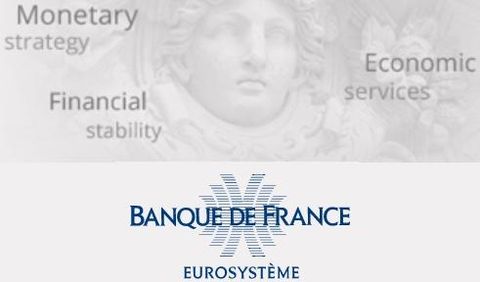Companies news
Banque de France : latest news

Please find some selected news from Banque de France’s office in Singapore.
The Euro area sovereign debt markets in the crisis : role and impact on financial stability perspectives- Risk Net Live 2021
Speech by Denis Beau, First Deputy Governor of Banque de France
The demand and supply environment in which European sovereign debt markets operate has changed over the last years and is still changing (…)
These changes do not seem to have altered the good functioning of the euro zone sovereign market. On the contrary faced with the economic and financial shocks triggered by the corona virus pandemic, they have fared well and proved resilient. They have consequently strongly helped, with the banking system, governments and the Eurosystem to implement forceful policies that have proved effective to help the private sector to absorb those shocks. In my initial remarks today I would like to highlight some dimensions of this resilience, looking in turns to bond and the repo market but also highlight a few vulnerabilities and point of attention from a financial stability standpoint that the role and functioning of Eurozone sovereign markets during the crisis has also revealed:margin calls and the sovereign-bank-corporate nexus.
A European safe asset: new perspectives
A genuine European safe asset would have several benefits for financial stability and European integration and would facilitate the financing of public policies by reducing borrowing costs. Many proposals aim at creating a European safe asset, often backed by national sovereign debt. These proposals are complex to implement: in addition to political issues, legal constraints complicate their adoption, and the determinants of the associated borrowing costs remain uncertain. The European Union’s measures in response to the Covid-19 crisis are fostering the emergence of a new supply of supranational debt to help Member States meet the challenges posed not only by the health crisis, but also by global warming and technological transition. While this new supply of safe assets is temporary and still limited compared to other currency areas, it nevertheless constitutes an important step for the European bond landscape due to its critical mass effect, which reduces liquidity risk.
A European safe asset: new perspectives
Green Swan conference – 3 June 2021
Speech by Sylvie Goulard, Deputy Governor of Banque de France
The title of the Green Swan is a play on the concept of Nassim (Nicholas) Taleb’s – the Black Swans, i.e. events affecting the financial sector that are unexpected, of a large magnitude and can be only explained afterwards, with analogies but also differences:
- It is quite certain that climate events will occur even if we don’t know when and how;
- They could be even worse than the ones caused by Black Swans, because climate change and many of its impacts are largely irreversible;
- no single agent (household, firm, financial institution, government) can hedge against these risks on her/his own. This means that managing Green Swans requires an unprecedented level of cooperation.
In ancient mythology Prometheus, who stole fire from the Gods ‐ i.e. encouraged energy consumption ‐ is severely punished, for eternity. Without envisaging such a punishment, we should react positively and decisively to the warnings we are receiving from scientists and from the authors of the Green Swan. Three underlying messages are enshrined in The Green Swan: acknowledging our multiple ecological crises beyond climate change; cooperating and coordinating our actions; and learning to live and thrive within limits. It is not only a topic for today’s conference but a challenge for each of us, for our societies and democracies, as well as for the financial system in the long run.
No country is an island. International cooperation and climate change
The discussion on the impact of climate change and of potential mitigation policies has gained momentum both in academia and policy circles over the last decades. Heatwaves, floods and natural disasters at broad are raising the awareness that the long-neglected costs of adverse climatic events might materialize sooner than expected. Scientific studies, endorsed by international agreements, have estimated that countries should reduce their emissions by about 50% in order to maintain the increase in temperature below 2 degree Celsius over the next century (IMF (2019)).
No country is an island. International cooperation and climate change
NGFS publishes the second vintage of climate scenarios for forward looking climate risks assessment
Today, the NGFS publishes the second vintage of the climate scenarios and a dedicated website, both aimed at fostering the integration of climate-related risks into the work of central banks and supervisors, and beyond.
- A new Set of climate scenarios: In this second vintage, the NGFS scenarios have been brought up to date, including by incorporating countries’ commitments to reach net-zero emissions. They have also been enriched with an expanded set of macroeconomic variables and additional country and sector-level granularity.
- An online NGFS scenarios website: This website serves as a portal to the NGFS scenarios and directs users to all related NGFS publications and data. It also provides interactive visualizations of the scenarios and background resources, and a link to a new Climate Impact Explorer where users can explore and download detailed physical risk data.
NGFS publishes the second vintage of climate scenarios for forward looking climate risks assessment
Welfare-Based Optimal Macroprudential Policy with Shadow Banks
In this paper, I show that the existence of non-bank financial institutions (NBFIs) has implications for the optimal regulation of the traditional banking sector. I develop a New Keynesian DSGE model for the euro area featuring a heterogeneous financial sector allowing for potential credit leakage towards unregulated NBFIs. Introducing NBFIs raises the importance of credit stabilization relative to other policy objectives in the welfare-based loss function of the regulator.
Welfare-Based Optimal Macroprudential Policy with Shadow Banks
Banque de France, Swiss National Bank and Bank for International Settlements Innovation Hub collaborate for experiment in cross-border wholesale CBDC
The experiment will explore cross-border settlement with two wholesale CBDC and a French digital financial instrument on a DLT platform. It will involve the exchange of the financial instrument against a euro wholesale CBDC through a delivery versus payment (DvP) settlement mechanism and the exchange of a euro wholesale CBDC against a Swiss franc wholesale CBDC through a payment versus payment (PvP) settlement mechanism. These transactions will be settled between banks domiciled in France and in Switzerland, respectively.
Banque de France ’s office in Singapore aims to provide enhanced monitoring of Asian economies and financial systems, and forge closer relations with central banks and financial authorities in the Asia-Oceania region. Banque de France strengthens its operational capacity to better serve international official sector entities in the Asian time zones.


